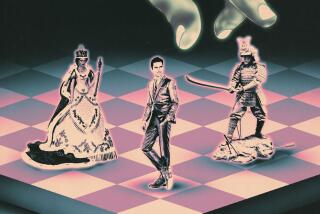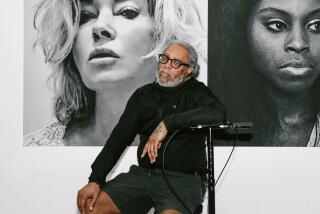ARCHER’S MINISERIES DUE ON KCET : FALL AND RISE OF A POLITICAL STORYTELLER
LONDON — Jeffrey Archer is an extremely unusual Englishman. A former Member of Parliament who resigned his seat 16 years ago because of impending bankruptcy, he resurrected his career with such best-selling novels as “Kane and Abel” and “The Prodigal Daughter.”
Eighteen months ago, he returned officially to politics when Prime Minister Margaret Thatcher appointed him deputy chairman of the Conservative Party. Then last November, Archer became embroiled in a sex scandal involving a prostitute and was forced to resign.
But like a jack-in-the-box, Archer has popped back up again on the British political scene--this time unofficially. In preparation for today’s British election, he has spent the last month “traveling around the country supporting the Conservative Party,” he explained.
Famous both as a novelist and as a controversial public figure, Archer draws crowds wherever he goes. “I’ve had 140 requests,” he said proudly. “I’m visiting 62 constituencies in 28 days, mostly marginal seats. I go on walkabouts, attend public meetings, do whatever I can to support the candidate.”
However, he still found time to promote his own literary works. On a day when he had several speaking engagements, he squeezed in an hour’s chat about “First Among Equals,” his nine-part miniseries that begins airing June 25 on KCET Channel 28 in Los Angeles, and offered a glimpse of a hectic political-media life.
Describing himself as “a politician who writes,” he claimed to see similarities between the two careers. “To survive as a politician, you have to be a storyteller,” he quipped.
Archer’s “First Among Equals” is about a subject extremely close to his heart: British politics. “ ‘First Among Equals’ shows our strange political system and how it works in an easy and palatable way,” he said.
Ensuring palatability are scenes of bribery, passion, revenge and financial improprieties, along with a touch of terrorism. “It’s frighteningly accurate,” Archer promised. The series has been made by Britain’s Granada Television, the company behind “Brideshead Revisited” and “Jewel in the Crown.”
“First Among Equals” follows the public and private lives of four MPs from their election to Parliament in 1964 up to 1990, when one of them rises to the position of prime minister. But which one? Who will receive the call from King Charles III?
“MPs and people in political life feel my book is very close to the real world,” Archer noted smugly. He positively preened with pleasure when confiding that several critics have described him as “the modern Trollope.” “I was very touched,” he said. Nineteenth-Century British novelist Anthony Trollope wrote “The Pallisers” series among other political novels.
After spending five years as an MP, Archer, 47, knows all about the workings of the British political system. Acknowledging that many Americans haven’t quite figured it out, he said flippantly, “Our system is based on 1,000 years of history. Yours is based on two-and-a-half minutes. No, maybe three-and-a-half minutes.”
Archer has developed a reputation in England for being a colorful maverick. An Oxford University graduate who got into politics through his ability to raise funds for charity, he has consistently managed to turn adversity to his advantage. His early financial difficulties, caused by a huge investment in a fraudulent Canadian company, became the basis for his first novel, “Not a Penny More, Not a Penny Less.”
Its huge success astounded and encouraged him. Since then, five more successful novels have fattened his bank balance. Recently, he purchased a historic mansion outside Cambridge, where he lives with his scientist wife Mary and their two sons, 14 and 12.
Now Archer has written a play, which will open in London’s West End this fall, starring Frank Finlay and Wendy Craig. Archer described it as “a courtroom drama about a lawyer who defends himself for the murder of his wife.
“I’m quite nervous about this one. If you put a book in a shop and it doesn’t sell, nobody notices. If you put on a play and ask people to watch, its failure is rather more obvious. We’re casting the play now, and I’ve seen every single person. I’m not having my play fail because of the actors. It’s got to be because of the play itself.”
While he’s at it, he would like to organize the sale of TV rights to “The Prodigal Daughter,” the sequel to “Kane and Abel” (which was dramatized on CBS in 1985). “We’ve had three deals fall through because they couldn’t put the money together,” he complained, “and now the project is back on the market. It will need a great actress.” Who could play the part? “Jane Fonda could walk it.”
Archer smiled contentedly. Few British politicos have the wherewithal to bandy about such high-priced American names. “I cannot grumble,” he said, “although I can’t afford as many Picassos as I’d like.” He has only three. However, he also owns two paintings by Pissarro and five by Miro.
Most of the paintings hang in his huge penthouse office, so near and yet so far from the House of Commons. “This place is unnecessary in its size,” Archer said in a rare sign of modesty. He gestured grandly around the L-shaped room, which appeared to be 75 feet across.
One corner belonged to his two secretaries, who at that moment were keeping tabs on his busy campaign itinerary. “Formerly I was deputy chairman of the Conservative Party,” Archer said, “and most people still treat me that way.”
He would like to go back into politics but acknowledged, “That’s not my decision. From a very young age I’ve always enjoyed being in the middle of what’s happening. I thought it was fun. Politics is my first love. If the Prime Minister thinks I can serve in any way, I will. I find it much wiser to assume nothing.”
Archer’s most recent debacle was triggered last fall by a big story in the News of the World, a mass-circulation British newspaper, which claimed he had offered a prostitute money to leave Britain to avoid a scandal. Archer immediately resigned his party position and said in a statement, “Foolishly, as I now realize, I allowed myself to fall into what I can only call a trap.”
Archer might have sat down with pen and paper to incorporate his experiences into his next book, except that he had already covered the subject two years earlier in “First Among Equals.” However, in his version, the MP who gets involved with a prostitute and is eventually threatened with blackmail survives the ignominy.
Unwilling now to talk about his own ignominy, Archer is, however, quite keen to offer his thoughts about Gary Hart’s similar predicament: “If Hart had played it properly, he could have ridden it through.”
A student of American politics, Archer set “Shall We Tell the President” and “The Prodigal Daughter” in the Washington arena. And he has strong views on the upcoming presidential election.
“I’m very distressed to think that the truly greats are not willing to be involved in that mad system of yours,” he said. “(New York Gov.) Mario Cuomo won’t stand. I hope he’ll be willing to change his mind. Why won’t (Chrysler chairman Lee) Iacocca stand? I think your candidates are very average. The most important job in the world is going to end up with people not worthy of it.”
Archer pointed favorably to Sen. Bill Bradley (D-N.J.). “He was at Oxford with me. I think very highly of him. And I suppose there’s Mr. (George) Bush. He’s a highly intelligent, qualified man to be President of the United States. I’d rather have that. Charisma is all very well, but being able to do the job is important.”
Archer’s preferred choice for President, however, is Britain’s current prime minister. “Eight years of Mrs. Thatcher is what America needs. But,” he said, smug to the end, “you can’t have her.”
More to Read
The complete guide to home viewing
Get Screen Gab for everything about the TV shows and streaming movies everyone’s talking about.
You may occasionally receive promotional content from the Los Angeles Times.






